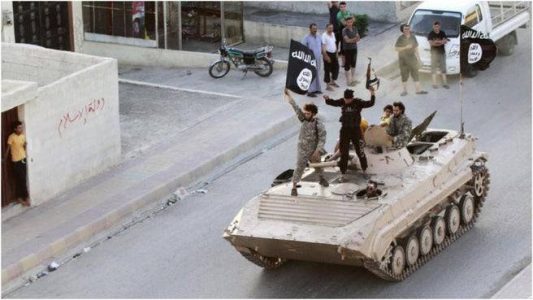
Islamic State is quietly rebuilding as the world is distracted by the coronavirus pandemic
The Islamic State has urged its terrorists to attack the West while it’s preoccupied with coronavirus, as experts warn the group could emerge stronger if left unchecked.
While ISIS has all but disappeared from headlines, the terrorist organisation is still a “powerful force”, according to experts.
Greg Barton, a Professor of Global Islamic Politics at Deakin University, says COVID-19 has allowed the group to undertake “a slow, steady rebuilding of the Islamic State”.
ISIS has advised its fighters to strike weakened states during the pandemic, dubbing the virus “God’s torment” upon the “Crusader nations” in its Al-Naba newsletter in March.
Barton told 10 daily the group is using the pandemic to its advantage by attempting to lessen citizens’ faith in their governments and infiltrate countries vulnerable to coronavirus.
“The Islamic State says COVID is a judgement from God on infidels. It also says not only is it divine judgement but when you see governments handling it badly, it’s showing signs as to why those governments haven’t worked,” he added.
“If we see a breakdown in governance in Indonesia or The Philippines, that’s an opportunity for the Islamic State.”
Barton also said a rise in far-right extremism in the West is likely to exacerbate Islamic terrorism in the next few years, with ISIS targeting victims of racial and religious prejudice.
It comes as Western states, including Australia and the US, have withdrawn some of their troops from counterterrorism missions over coronavirus concerns.
Meanwhile, local Iraqi forces, who are key players in the fight against ISIS, have been distracted with containing COVID-19.
Dr Farida, a Middle East expert at the University of NSW told 10 daily the lack of military presence in Afghanistan and Iraq could be exploited by the terrorist group.
“By withdrawing troops, you leave space for non-state groups such as the Islamic State to operate freely,” Dr Farida, a Middle East expert at the University of NSW told 10 daily. “It does mean there is a possibility they’re giving space to terrorist groups to move more freely and creating a security vacuum for groups that want to expand further,” she said.
Meanwhile, in Syrian jails, where there are currently around 5,000 ISIS fighters, reports have emerged of prisoners escaping, citing fears of contracting COVID-19.
Prisoners reportedly made holes in the walls and tore off doors during prison riots in March, overwhelming the Kurdish-backed Syrian Democratic Forces, according to The Guardian.
Despite some claiming the death of its leader Abu Bakr al-Baghdadi last October would shatter the terrorist militants, support for ISIS has not ceased.
The Islamic State may prove harder to defeat than Al-Qaeda as its decentralised nature means it draws support from sympathisers all over the world.
Even then, the global battle to erase Al-Qaeda is bordering on two decades.
“The Islamic State still has pocket groups where it might be hiding in Syria and Iraq,” Dr Farida said.
“Once American soldiers were asked to leave Syria, some of these fighters managed to escape to different parts of the world. Some are in Lebanon, hiding in hidden cells, some have escaped into Afghanistan and Pakistan and some are in Indonesia.”
However, Jacinta Carroll from the National Security College says border shutdowns and restrictive movement have made it “difficult for terrorist groups to operate and move freely” during the pandemic.
“The coronavirus is detrimentally affecting terrorist groups just as it is affecting others around the world,” Carroll said.
“Members can and will be infected; financial support will dry up as ISIS supporters have to deal with other economic priorities; illegal movement of terrorists and weapons will be severely restricted as border controls around the world are tightened,” she added.
“This also has serious consequences for ISIS’ sources of income, which include drug, people and weapons trafficking.”
At the peak of its success, ISIS’s income was derived from its sophisticated taxation system of villages, donations from sympathisers and through revenue it received from selling oil on the black market to Russia and Turkey.
While the group is rebuilding in the shadows, large-scale terrorist attacks in the West are unlikely during coronavirus lockdown.
Barton said ISIS is first working to recruit local fighters and organise killings in the Middle East before carrying out more sophisticated terror operations abroad.
“It’s not that they’ve stopped trying but we have good counterterrorism structures in the West. It’s terrorism success and counterterrorism failures that make for a news story,” Barton said.
“Terrorism failure makes for a very small footnote,” he added.
“They’re focusing on insurgencies in Iraq and Syria, long term play. In the next few years, they’ll swing back to encouraging western-based cells.”
Source: 10 Daily





